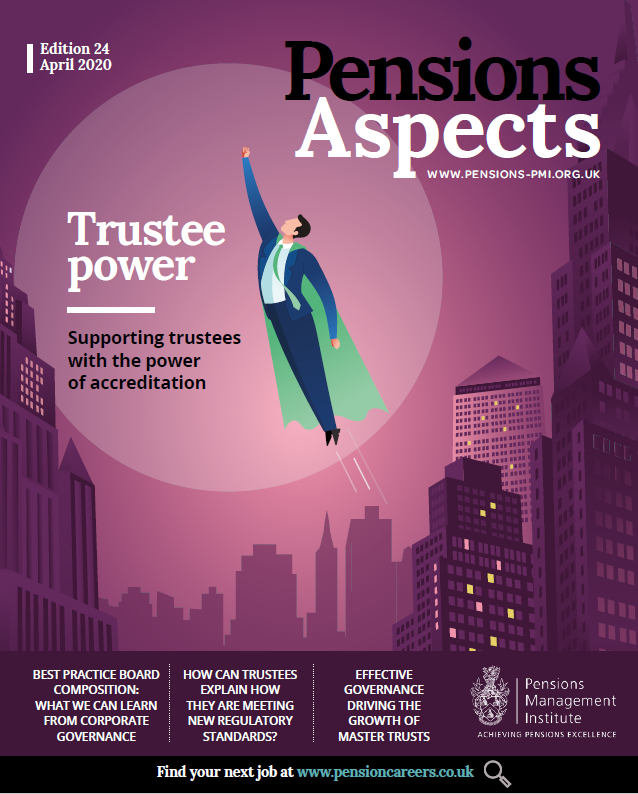
What now for Trustees?
It has now been a couple of months since the Pensions Regulator (TPR) set out its response to the Future of Trusteeship and Governance consultation. The industry responded in large numbers to the consultation; the most input TPR has ever received. After surveying its members the PMI responded with the members views. As our purpose is:
“To set and promote standards of excellence and lifelong learning for employee benefits and retirement savings professionals and trustees through qualifications, membership and ongoing support services,”
it is unsurprising the membership fully supports the campaign by TPR in its desire to improve standards of trusteeship and governance but, as to be expected, there were words of warning about how to do it.
TPR is concerned with the knowledge and experience of trustees and is looking to review the content of the Trustee Knowledge and ToolKit (TKU) and will simplify its presentation of its TKU expectations as set out in its 21st Century Trustee campaign.

Pensions Aspects April 2020
However, it is not currently looking to change the regulations regarding the requirement for qualifications or Continual Professional Development (CPD). This is quite disappointing and does not reflect the views of our membership. Nearly two thirds of our membership responding to our survey, felt there should be a requirement for evidencing continual learning, with over two thirds believing a formal CPD programme would be beneficial. TPR states it will explore what is appropriate in terms of ongoing learning activities and time, possibly setting it a requirement of 10 hours for lay trustees and 25 hours for professional trustees.
Some years ago PMI introduced a voluntary CPD scheme for members of its Trustee Group. Boards that use this consistently demonstrate high standards of governance and we believe that such a scheme would be beneficial to all trustee boards.
With over 1200 trustee members we find the best trustee boards prepare an annual training plan, and we believe this should be encouraged for all trustees. Interestingly our members felt TPR should concentrate on setting standards and publicising them, leaving the industry to get on with providing the framework to deliver the education piece.
It was decided at this point not to make it a requirement for every trustee board to have a professional trustee onboard. The membership was divided on this with 41% feeling this should be a requirement. When we looked at our professional trustee members, this increased to 47%. We believe, at this time, it is right not to make it mandatory as it could lead to issues with the supply of quality professional trustees and have the opposite effect to that which is intended. Should this be reconsidered, a solution could be phased in depending upon scheme size, complexity, funding position, or combination, and over a period of five years.
Again, TPR is not mandating but strongly advising professional trustees to become accredited. The Professional Trustee Standards Working Group (PTSWG) set out the process for accreditation with the Association of Professional Pensions Trustees (APPT), creating and maintaining the standards with the PMI running the administration of the accreditation process and providing the qualifications element. Now launched as APTitude, we look forward to seeing Professional Trustees acquiring their accreditation and then monitoring their CPD requirements. For full details on what it takes to become accredited, please visit our website: www.aptitude-pmi.org.uk
The accreditation process is only part of the solution to improving governance; our aim is to go further.
We will be looking to provide specific education and training programmes to support professional trustees. The PMI has always excelled in providing technical unbiased education, not clouded by a house view, and we are now able to provide targeted educational events to meet the different needs of our trustee membership.
Moving on to board diversity, TPR will be setting up a working group to investigate the subject of diversity on boards. It seems TPR agrees with our membership as the majority were not in favour of trustee boards having to report on actions taken to improve diversity. It is hoped the working group can find innovative and practical ways of helping trustee boards to overcome some longstanding barriers to improving diversity. This seems another area where TPR is allowing the industry to get its house into order with a helping hand, but holding the threat of revisiting the possibility of regulation if we do not make progress ourselves.
Another contentious area of the consultation was that of sole trustees. To some schemes a sole trustee is a cost-effective solution enabling higher standards or governance whilst to others, it’s an opportunity for abuse by the employer. Irrespective of this, the membership felt sole trustees should be held to higher standards than other professional trustees. Interestingly, given TPR’s concerns in this area, it looks likely TPR will leave well alone, again allowing the industry to self-regulate in so far as the APPT producing an industry code for sole trustees.
We are now in the second quarter of 2020; trusteeship and governance standards remain firmly in TPR’s sights. The focus on demonstrating good governance will continue. Our belief is that to deliver good member outcomes you need an effective board with the right mix of knowledge and experience, whether from lay or professional trustees. However, to ensure you have the right knowledge and experience you need to keep learning and learning the right things, which is what the PMI aims to provide to all pensions professionals.
Last update: 26 February 2021
You may also like:



